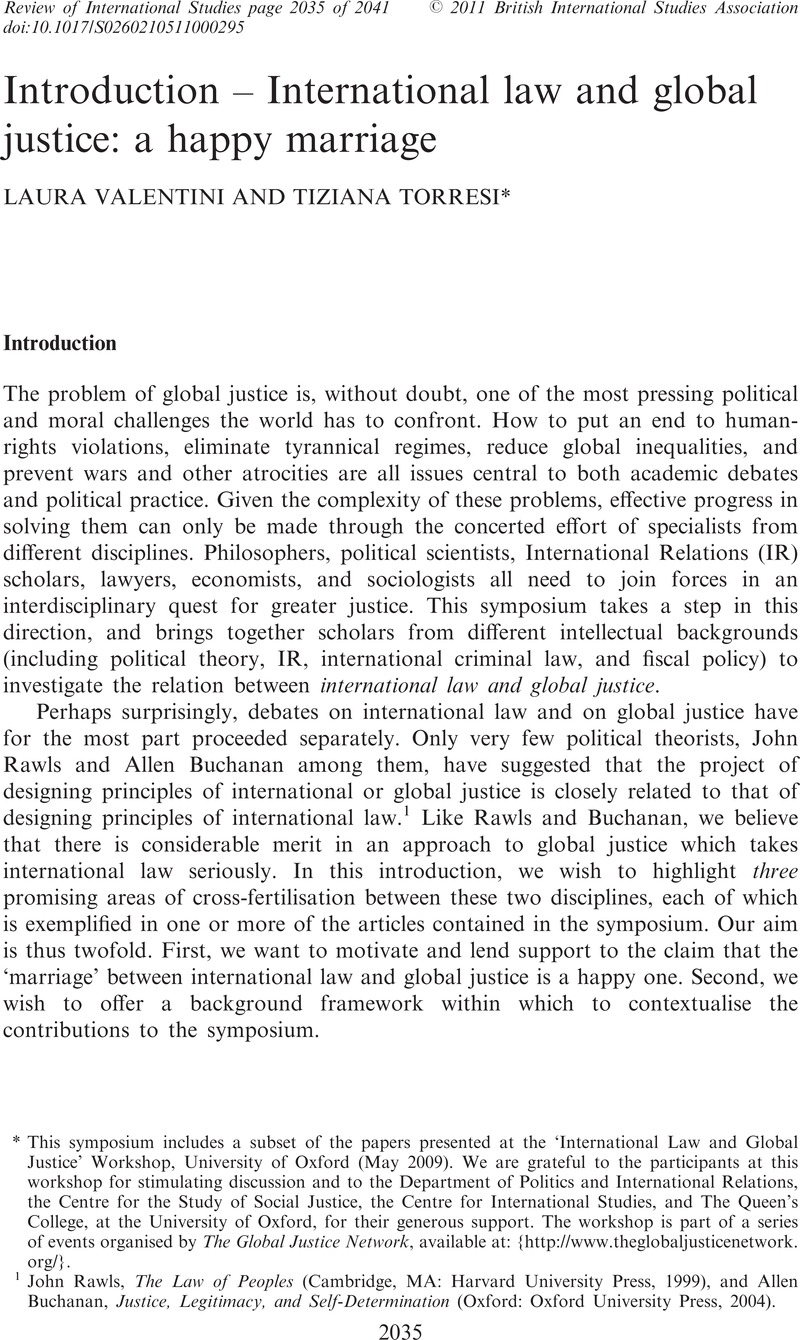Published online by Cambridge University Press: 09 November 2011

1 Rawls, John, The Law of Peoples (Cambridge, MA: Harvard University Press, 1999)Google Scholar , and Buchanan, Allen, Justice, Legitimacy, and Self-Determination (Oxford: Oxford University Press, 2004)Google Scholar .
2 Here we follow standard definitions of international law and their sources. See, for example, Cassese, Antonio, International Law (Oxford: Oxford University Press, 2001)Google Scholar .
3 These are requirements of justice on which both so-called statist and cosmopolitan theorists agree.
4 Kant, Immanuel, The Metaphysical Elements of Justice. Part I of the Metaphysics of Morals (1797), trans. Ladd, John, 2nd ed. (Indianapolis/Cambridge: Hackett, 1999)Google Scholar . For contemporary discussions of Kant's political theory see Stilz, Anna, Liberal Loyalty: Freedom, Obligation, and the State (Princeton: Princeton University Press, 2009)CrossRefGoogle Scholar , chap. 2, and Waldron, Jeremy, ‘Special Ties and Natural Duties’, Philosophy and Public Affairs, 22:1 (1993), pp. 3–30, esp. pp. 14–15Google Scholar .
5 Kant, Immanuel, Toward Perpetual Peace: A Philosophical Sketch (1795)Google Scholar , in Kant's Political Writings, trans. Nisbet, H. B. and ed. Reiss, H. (Cambridge: Cambridge University Press, 1970), pp. 93–130Google Scholar .
6 See Flikschuh, Katrin, ‘Kant's Sovereignty Dilemma: A Contemporary Analysis’, Journal of Political Philosophy, 18:4 (2010), pp. 469–493CrossRefGoogle Scholar , for discussion.
7 For this approach see Dworkin, Ronald, Law's Empire (Cambridge, MA: Harvard University Press, 1986), chap. 2Google Scholar . See also James, Aaron, ‘Constructing Justice for Existing Practice: Rawls and the Status Quo’, Philosophy and Public Affairs, 33:3 (2005), pp. 281–316CrossRefGoogle Scholar ; and Sangiovanni, Andrea, ‘Justice and the Priority of Politics to Morality’, Journal of Political Philosophy, 16:2 (2008), pp. 137–164CrossRefGoogle Scholar . For a critique of this approach see Laura Valentini, ‘Global Justice and Practice-Dependence: Conventionalism, Institutionalism, Functionalism’, Journal of Political Philosophy, forthcoming. We borrow the term ‘practice-dependent’ from Sangiovanni in particular. The term ‘constructivist’ is instead used by Meckled-Garcia. See the next note for details.
8 Meckled-Garcia has rejected the label ‘practice-dependent’ as an appropriate description of his own approach, opting instead for the label ‘constructivist’. See Meckled-Garcia, Saladin, ‘On the Very Idea of Cosmopolitan Justice: Constructivism and International Agency’, Journal of Political Philosophy, 16:3 (2008), p. 251CrossRefGoogle Scholar . In this introduction we intend to remain neutral between the two labels. All we want to indicate is a general family of views which hold that the appropriate principles for a given sphere of human action or practice depend on the point and purpose of that practice.
9 Notwithstanding the considerable difficulties encountered by many migrants due to border control.
10 See Simmons, A. John, ‘On the Territorial Rights of States’, Philosophical Issues, 11:1 (2001), pp. 300–326, esp. p. 305CrossRefGoogle Scholar . In his account Simmons refers to Copp, David, ‘The Idea of a Legitimate State’, Philosophy and Public Affairs, 28:1 (1999), 3–45CrossRefGoogle Scholar .
11 See Valentini, Laura, Justice in a Globalized World: A Normative Framework (Oxford: Oxford University Press, forthcoming), chap. 9CrossRefGoogle Scholar , and Ronzoni, Miriam, ‘The Global Order: A Case of Background Injustice? A Practice-dependent Account’, Philosophy and Public Affairs, 37:3 (2009), pp. 229–256CrossRefGoogle Scholar .